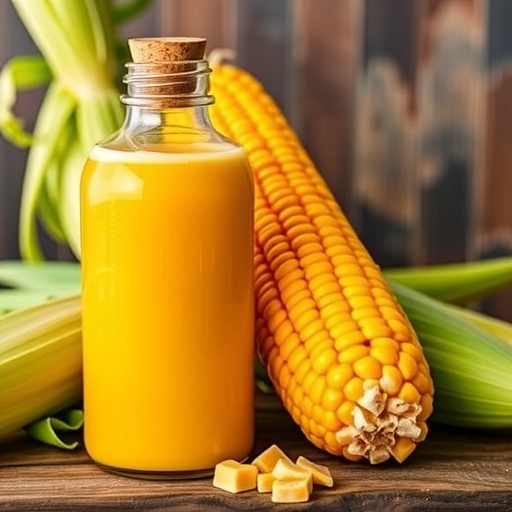In the quest for novel functional foods that not only provide nutrition but also promote health, the role of fermentation by lactic acid bacteria (LAB) continues to gain prominence. A groundbreaking study recently published delves into the intricate effects of complex fermentation involving two specific strains of LAB on corn juice—a widely consumed and nutrient-rich beverage. This research elucidates how such fermentation processes modulate antioxidant and hypoglycaemic activities, alongside comprehensive metabolomic transformations, propelling corn juice into the spotlight as a potential functional beverage with profound health benefits.
Corn, a staple cereal grain worldwide, contains an array of bioactive compounds such as phenolics, carotenoids, and polysaccharides, which contribute to its nutritional and antioxidant potential. However, the bioavailability and biological efficacy of these compounds can be significantly influenced by fermentation. The studied complex fermentation strategy deploys two lactic acid bacteria species in tandem, seeking not just to preserve but to enhance biochemical attributes, thereby harnessing microbial metabolic capacities to transform corn juice dynamically.
Central to the investigation was the examination of antioxidant activity—one of the pivotal markers of health-promoting potential within foods. Oxidative stress is implicated in the pathogenesis of numerous chronic diseases, including diabetes and cardiovascular conditions. Fermentation with dual LAB strains demonstrated a marked elevation in antioxidant capacity compared to both non-fermented corn juice and juice fermented with a single LAB strain. This augmented antioxidative profile suggests an interactive synergy between the bacterial populations, enhancing the liberation or biotransformation of antioxidant compounds during fermentation.
.adsslot_P61iqMwDOh{ width:728px !important; height:90px !important; }
@media (max-width:1199px) { .adsslot_P61iqMwDOh{ width:468px !important; height:60px !important; } }
@media (max-width:767px) { .adsslot_P61iqMwDOh{ width:320px !important; height:50px !important; } }
ADVERTISEMENT
Parallel to the antioxidant assessment, the study probed hypoglycaemic activity, an indicator of a food’s potential to modulate blood glucose levels—a critical factor in diabetes management. Remarkably, the dual-strain fermented corn juice exhibited enhanced inhibitory effects on enzymes such as α-glucosidase and α-amylase, key players in carbohydrate digestion and glucose absorption. This enzymatic inhibition signifies the fermented juice’s potential to attenuate postprandial blood glucose spikes, underscoring its promise as a functional food ingredient targeting glucose homeostasis.
Metabolomic analysis, deploying cutting-edge mass spectrometry and bioinformatics, provided an in-depth molecular snapshot of the fermentation-induced chemical landscape changes. The dual fermentation process altered metabolite profiles substantially, enriching several bioactive compounds including organic acids, amino acids, and phenolic derivatives. These metabolites are not only instrumental in antioxidant functions but also carry roles in modulating metabolic pathways linked to glucose metabolism and cellular signaling, revealing a complex biochemical interplay driven by LAB co-fermentation.
Crucially, the study underscores the complementary metabolic activities of the two LAB strains used. One strain, known for its saccharolytic capabilities, efficiently metabolized complex carbohydrates into simpler, readily fermentable sugars, which the second strain then transformed into bioactive metabolites with health-promoting functionalities. This dynamic metabolic handoff maximized biochemical outputs far beyond what single-strain fermentations typically achieve, illustrating the value of strategic microbial consortium design.
From a mechanistic perspective, the study points to the liberation of phenolic acids from bound forms, facilitated by microbial enzymatic activities such as β-glucosidase and esterase functions. These liberated compounds exhibit superior antioxidant efficacy, being chemically more reactive and bioavailable. The simultaneous accumulation of short-chain fatty acids and organic acids during fermentation further contributes to the health-promoting profile by influencing gut microbiota and systemic metabolism upon consumption.
In addressing diabetic conditions, the fermented corn juice’s inhibition of key digestive enzymes proposes a nutraceutical intervention that can complement pharmacotherapy. Non-pharmacological dietary solutions such as these fermented products offer holistic management strategies with potentially fewer side effects, reinforcing the importance of functional food research in public health arenas confronting rising metabolic disorder prevalence.
The methodology leveraged in the study showcases a sophisticated combination of controlled fermentation setups, enzymatic assays, metabolite profiling through liquid chromatography-mass spectrometry (LC-MS), and bioinformatic data integration. This multi-layered analytical framework not only ensures robustness but sets a new standard for future investigations into fermentation’s impact on food bioactivity.
While the health benefits of fermentation are well-documented, this research uniquely contributes by demonstrating that co-culturing selected LAB strains can unlock enhanced and targeted biological activities with quantifiable metabolic shifts. The findings open avenues for customized probiotic-fermented beverages tailored towards antioxidant and glycemic control, responding to consumer demand for natural, effective health solutions.
Scaling these fermentation strategies to industrial applications holds promise, particularly as consumers increasingly seek plant-based and functional beverages with scientifically validated benefits. The metabolic diversity achieved hints at the potential creation of novel flavor and texture profiles alongside health functionalities, expanding the sensory and therapeutic appeal of such products.
In summation, this pioneering work delineates how complex fermentation by defined lactic acid bacterial consortia can amplify the health properties of corn juice through multi-dimensional biochemical modifications. Integrating fermentation science with advanced metabolomics, it provides a roadmap for engineering next-generation functional foods that marry nutrition, health, and consumer desirability—the very ingredients for transformative impacts in the food industry and human health alike.
Subject of Research: Effect of complex fermentation by two lactic acid bacteria strains on the antioxidant activity, hypoglycaemic activity, and metabolomic profile of corn juice.
Article Title: Effect of complex fermentation of two lactic acid bacteria on antioxidant activity, hypoglycaemic activity and metabolomics of corn juice.
Article References:
Zhuang, H., Dai, Y., Huang, Q. et al. Effect of complex fermentation of two lactic acid bacteria on antioxidant activity, hypoglycaemic activity and metabolomics of corn juice. Food Sci Biotechnol (2025). https://doi.org/10.1007/s10068-025-01853-8
Image Credits: AI Generated
DOI: https://doi.org/10.1007/s10068-025-01853-8
Tags: antioxidant activity in beveragesbioactive compounds in cornchronic disease prevention with foodscorn juice as a functional beveragedual lactic acid fermentationfunctional foods from fermentationhealth benefits of corn juicehypoglycaemic effects of corn juiceinnovative fermentation strategies for healthlactic acid bacteria in food sciencemetabolic transformations in fermentationnutritional enhancement through fermentation





